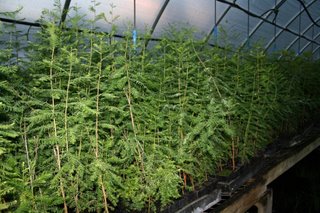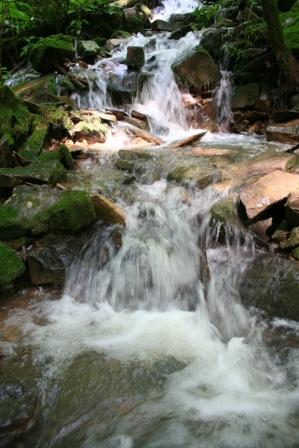Tuesday, October 31, 2006
A Native American Proverb
A Native American proverb.
So, why do we insist on leaving our children with nothing? A report from 2005, based on a study by 1,360 experts in 95 nations, stated that "humans are damaging the planet at an unprecedented rate and raising risks of abrupt collapses in nature that could spur disease, deforestation or "dead zones" in the seas." How many reports need to be published before people realize that this planet is in a downward spiral?
Hurricanes Katrina and Rita devastated the Gulf Coast. With greatly diminished wetlands, the storm surges ran inland for miles almost unchecked. The logical response to this disaster is to begin reclaiming coastal areas for planting trees and restoring wetlands. Or is it? The Corps has proposed reducing and even eliminating permitting requirements for filling wetlands in the Gulf Coast to aide in rebuilding efforts. The need for so much rebuilding was exacerbated by the diminished wetlands and now they want to make it easier to fill in what is left.
I think we have already borrowed more from our children than we can ever pay back. It's time to do something different.
Thursday, October 05, 2006
About EarthMark
The core of an EMIP (Early Maturity Inducement Process)® tree's success is in its roots. These trees are grown in successively larger pots until ready for sale and planting on site. Bare root seedlings are typically planted in the ground at a nursery and allowed to grow for 1 to 3 seasons before being dug up and potted for sale. Digging up the bare root seedling cuts or tears the roots causing a period of transplant shock, which EMIP (Early Maturity Inducement Process)® trees do not experience. The EMIP (Early Maturity Inducement Process)® also causes massive production of feeder roots, which allow the tree to "believe" that it is 15 to 20 years old after one growing season. This accelerates the tree's growth, causes early nut/fruit production, gives the tree a more solid foundation once planted and provides a greatly increased ability to obtain oxygen, water and food during harsh conditions (flood or drought) during the trees early stages.
How You Can Help Save the Environment
 Wetlands are among the most productive habitats on earth providing shelter and nursery areas for commercially and recreationally important animals like fish and shellfish, as well as wintering grounds for migrating birds. Louisiana contains 40 percent of the coastal wetlands in the lower 48 States and for the last 50 years has lost an average of 34 square miles a year. The 2005 hurricane season greatly intensified this loss. The change from land to water in all of coastal Louisiana from 2004 to 2005 was 118.2 square miles, almost 25% of the land loss projected to occur over a period of 50 years (2000 - 2050) by the Louisiana Coastal Area Ecosystem Restoration Study.
Wetlands are among the most productive habitats on earth providing shelter and nursery areas for commercially and recreationally important animals like fish and shellfish, as well as wintering grounds for migrating birds. Louisiana contains 40 percent of the coastal wetlands in the lower 48 States and for the last 50 years has lost an average of 34 square miles a year. The 2005 hurricane season greatly intensified this loss. The change from land to water in all of coastal Louisiana from 2004 to 2005 was 118.2 square miles, almost 25% of the land loss projected to occur over a period of 50 years (2000 - 2050) by the Louisiana Coastal Area Ecosystem Restoration Study.
EMIP is working with academic universities to replant marsh and wetland areas from the Louisiana Gulf Coast to the Florida Everglades. For $15.00, a tree (cypress, water oak, button brush, etc.) can be produced in a nursery, shipped to a project location and planted in a restoration project. You can help. Whether your donation is enough for a tree or a whole forest, you can do your part to protect and reclaim this vital piece of our environment.
Every cent of every donation goes directly to producing a tree.
If you would like, you can donate now. ![]()
 Cypress seedlings in an EarthMark nursery greenhouse.
Cypress seedlings in an EarthMark nursery greenhouse.  Cypress trees in pots at an EarthMark nursery.
Cypress trees in pots at an EarthMark nursery.
